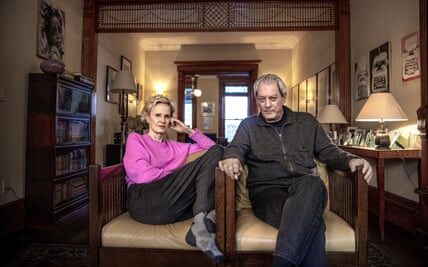Which of these statements most closely represents your views about 007? A) James Bond has gone too woke; b) James Bond is a racist, sexist, imperialist dinosaur who has no place in the modern world; c) I’ve never given it much thought, really. I like the car chases, the nice locations and the stunts.
Most sensible people would pick option “c”. It’s just a bit of fun and best not to overthink it. But there are many people who are obsessed with James Bond and what he represents. Including me. And, as with fans of any cultural artefact – be it Star Wars, a football team, a music act – their biggest fans are their biggest critics. Everyone thinks they own Bond. They know what he is, who should play him in his next incarnation, how the films should be, how Bond should be. And they reserve their highest criticism for the two family firms that do actually own him – EON, which makes the films, and Ian Fleming Publications (IFP), which publishes the books. This sense of affronted ownership can perhaps best be summed up by Alan Partridge frustratedly snapping “Stop getting Bond wrong” in an oft-posted clip.
Who Bond is, and how he can work in the contemporary world are questions EON has been asking since the release of Dr No, and they are questions I had to ask when IFP approached me last year to write a book to tie in with three things that coincided in 2023 – the coronation of King Charles, the 70th anniversary of the publication of Casino Royale (the first Bond book), and the 60th anniversary of Fleming’s On Her Majesty’s Secret Service. IFP had nothing more than a title – On His Majesty’s Secret Service – but it was an intriguing idea, and I jumped at the chance of writing my first adult Bond adventure.
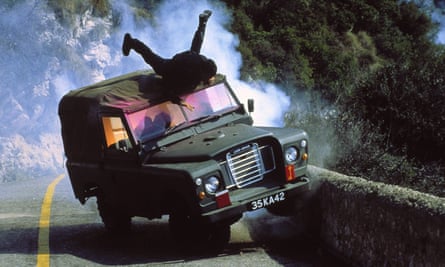
So who is 007? He’s whoever we first saw playing him on screen, whether in the cinema, or, more likely, on television. And no matter who plays him he somehow always remains “James Bond”. Because the essentials are unchanging – fast cars, beautiful women, outrageous action sequences, great tailoring, Moneypenny, MI6, M, Q, Smersh, Spectre, 007, Felix Leiter, a Bond villain, a villain’s lair, a plot to cause worldwide chaos … foiled by a man with a neat handgun in a shoulder holster, wearing black tie, drinking a martini (shaken not stirred) who announces himself in a peculiarly pedantic way. “The name’s Bond – James Bond.” It’s ridiculous and it’s perfect: perfectly ridiculous. A formula so familiar that it’s been parodied almost since the first novel was published.
The Bond films themselves have often skirted the fringes of self-parody. When you think of 007, you can’t help but picture a union jack parachute unfurling after Roger Moore skis off a cliff. Or perhaps Daniel Craig and the queen parachuting into the London Olympics. Elizabeth came to the throne in 1953 – the same year as Casino Royale was published. Craig’s Bond died in 2021; she died in 2022.
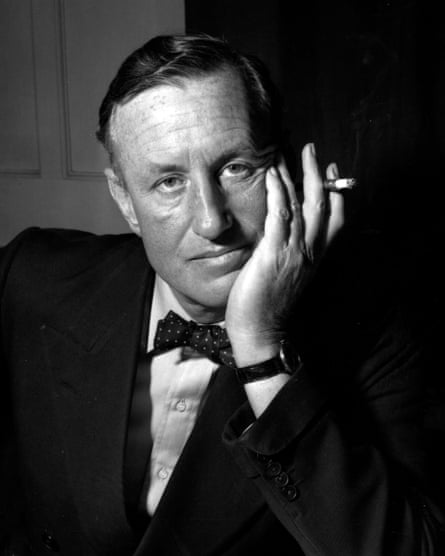
Bond and the Royal family are inextricably linked. And Bond is as much a national symbol as Queen Elizabeth was. The coronation of King Charles marked a big change. I wanted to investigate that in my book.
So, how to reflect that? To make Bond new, but remain true to the spirit of Fleming? To start with, Bond must be 35. Fleming kept him that age over the course of 14 books. He was a man who had been shaped by the second world war. My 2023 incarnation would have been shaped by a very different world in which many of the old certainties of identity, empire, masculinity and nationalism had shifted. For instance, who are the enemies now?
When the literary series started, the enemy was Smersh, the anti‑spy division of the Soviet counterintelligence organisation. But in an effort to woo the US market, Fleming soon pitted Bond against American gangsters (Live and Let Die), and, after a while, Fleming said he was going to stop using the Russians as the bad guys as he foresaw that sooner or later we’d be trying to make friends with them. This is when he hit on his masterstroke and created the international criminal organisation SPECTRE, the Special Executive for Counter-intelligence, Terrorism, Revenge and Extortion. This could neatly keep James Bond away from actual real-world matters. The film-makers seized the idea and, for the most part, have stayed well away from geopolitics.
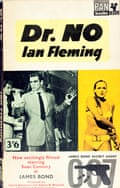
So as not to offend anyone, they went through a period of having renegade Russian generals, renegade Chinese generals, renegade American generals. With the benefit of hindsight, they perhaps wouldn’t have allied Timothy Dalton’s Bond with the heroic, anti-Soviet mujahideen (who mutated into the Taliban) in The Living Daylights. Today’s enemy is tomorrow’s friend, and vice versa.
But I wanted my book to be about something, not just pastiche. So, just as Goldfinger recruits a bunch of colourful American gangsters, my villain recruits a colourful bunch of contemporary disruptors – far-right, populist libertarians.
It did very well on publication, and raised no eyebrows, but a few months ago people started posting screen grabs of pages online, trying to imply that I had “broken” Bond and turned him into a libtard snowflake cuck. A true, red-blooded James Bond should be going up against commies, liberals, all-purpose Arab terrorists, Just Stop Oil protesters and the whole woke brigade.
Bond doesn’t stop to think too deeply about these things. He simply does what he’s told. As Fleming said in an interview with Playboy magazine: “He’s a cipher, a blunt instrument in the hands of government.” Intriguingly, he also said, in the same interview: “He’s certainly got little in the way of politics, but I should think what politics he has are just a little bit left of centre.”
I was even accused by some disgruntled keyboard warriors of “turning Bond gay” – despite the fact that, in my book, he sleeps with two women (not that any of them had actually read it). They seemed to be scornful that Bond’s relationships in my book are “metrosexual” – modern, equal and relaxed. He has lost some of his old-school sense of sexual entitlement, which, while often done tongue in cheek in the past, doesn’t play so well nowadays. In the novels, Fleming was arguing for sexual freedom and honesty, for taking women down from their pedestals, and admitting to mutual, animal desires. Some of this today reads as misogynistic, but that was never Fleming’s intention. 007’s sexuality has always been interesting – and core to his appeal.
He is such a familiar figure and has, over the course of 70 years, been the model for so many other heroes that we have perhaps lost sight of how strange he is. The fact is, there have always been certain stereotypical gay characteristics about Bond. His camp obsessiveness about food and drink, his encyclopedic knowledge of women’s perfume, his obsessions with what he, and others, wear.
after newsletter promotion
In his excellent book James Bond: The Man and His World, written after he was given access to the Ian Fleming archives, Henry Chancellor writes that if Bond’s habits, such as choosing the correct type of egg to scramble, make him sound “extraordinarily fastidious and more than a little old maid-ish, then it was, as all these details were provided by William Plomer, Fleming’s bookish, gay editor, who was always on hand to suggest the precise make of jam or type of hen if Fleming needed it. In the manuscripts of the books these details were routinely left blank and were filled in only once Ian had canvassed around for some expert opinions on the precise brand and vintage.”
Perhaps this is an early example of the “Queer Eye for the straight guy” phenomenon. I remember in 1977 dressing up to go out to a punk gig and my father reprimanding me, not because my clothes were outlandish, but because it was not really done for young men to think too much about what they were wearing. He implied that it would brand me as a homosexual. Fleming was quite quirky in the way he dressed, preferring short sleeved shirts, for instance and there are some photographs of him wearing trousers with waists so high they’re in danger of throttling him. There’s a lot of detail in the books about Bond’s wardrobe (and his enemy’s – Bond famously realises that the Russian agent Red Grant is not the English gent he’s pretending to be, when he clocks his “common” Windsor tie knot).
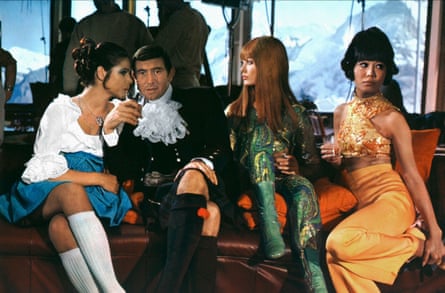
David Lowbridge-Ellis runs the Licence to Queer website and X account, whose mission is “to uncover why James Bond appeals so much to LGBTQIA+ people”. So, I asked him – what exactly is his appeal?
“Although he’s sometimes viewed as an establishment figure, Bond is an outsider. He doesn’t fit in. Queer people can certainly relate. And he appeals to a lot of queer people because he represents an alternative life story to one offered by our heteronormative society. We don’t imagine him settling down with someone of the opposite sex to raise kids any time soon.”
Bond is a fantasy figure. A very male fantasy – he has no domestic life at all. We never see him down the pub with his mates talking about football. We never see him visiting his bank manager to ask for an overdraft. Or mowing the lawn. Washing his car. He is the ultimate gentleman. He knows what to say and do in any given situation. There would never be an embarrassed discussion about how much to tip at the end of one of his lavish meals. He’s a man who lives for work. We rarely see him at home. He mostly lives in hotels and eats in restaurants. He drives fast cars, he travels the world, he drinks and smokes heavily, he has sex with a string of women but never becomes attached to any of them … and he gets to kill people.
He’s a man defined by what he does. As Fleming pointed out in an interview for Counterpoint in 1963: “If you’ve read the books, you’ll find that there’s absolutely no discussion anywhere of Bond’s character – some of his mannerisms of course – but no character study in depth … I don’t think that he is necessarily a good guy or a bad guy. Who is? He’s got his vices and very few perceptible virtues except patriotism and courage, which are probably not virtues anyway.”
I believe that as long as Bond can remain an outrageous fantasy he will endure. No Time to Die experimented with grounding Bond and giving him a reality. I prefer the cocktail-fuelled rush of the night before. I don’t want 007 waking up to find he’s got a wife and a kid and a mortgage and the Aston Martin needs to go in for repairs and he has to negotiate a new phone contract.
Source: theguardian.com
